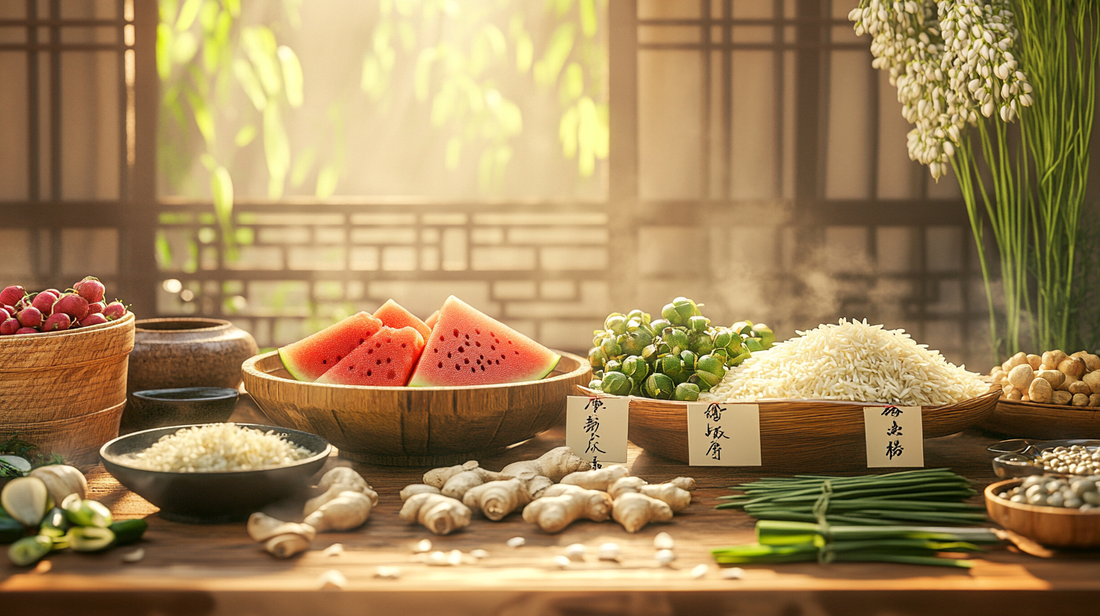
Food Energetics: How TCM Treats with Diet
Share
Introduction
In Traditional Chinese Medicine (TCM), food is more than fuel — it is medicine. Every food has energetic properties that influence the body's internal balance of Yin and Yang, Qi and Blood. The idea is simple but profound: what you eat can either nourish your body or disturb its natural harmony.
At Vital Duo, we often integrate food energetics into treatment plans for pain, digestion, emotional health, hormonal balance, and immune support. Understanding how TCM views food offers a practical, empowering way to support healing through everyday choices.
In this blog, we'll explore the key concepts of food energetics, how different foods impact the body, and how dietary therapy complements acupuncture, herbal medicine, and other treatments.
What Are Food Energetics?
In TCM, foods are classified by:
- Temperature: Hot, Warm, Neutral, Cool, Cold
- Flavor: Sweet, Sour, Bitter, Pungent, Salty
- Direction: Upward, Downward, Outward, Inward
- Organ Affinity: Certain foods benefit specific organs (e.g., carrots for the Spleen)
These qualities affect how a food influences internal energy flow. Unlike Western nutrition, which focuses on calories and macronutrients, TCM looks at how foods change the body's internal landscape.
Chinese Dietary Therapy (2021): Food choices based on energetic properties improve clinical outcomes in digestion, pain, and chronic fatigue syndromes.
Temperature: Warming vs Cooling Foods
Foods are energetically warming or cooling, regardless of whether they are eaten hot or cold.
Warming foods include ginger, lamb, cinnamon, and garlic. They stimulate circulation, warm the core, and are ideal for people with cold hands and feet, fatigue, or weak digestion.
Cooling foods like watermelon, cucumber, mint, and lettuce clear heat, reduce inflammation, and calm excess Yang. They are helpful for conditions like acne, sore throat, and summer heat exhaustion.
Choosing foods based on your internal condition—not just the weather—is central to TCM dietary practice.
Flavour and Therapeutic Actions
In TCM, flavours have distinct therapeutic effects:
- Sweet (e.g., carrots, rice) nourishes and harmonises.
- Sour (e.g., lemon, vinegar) astringes and preserves fluids.
- Bitter (e.g., bitter melon, dandelion) clears heat and dries dampness.
- Pungent (e.g., onions, ginger) promotes circulation and disperses stagnation.
- Salty (e.g., seaweed, miso) softens hardness and nourishes the Kidneys.
Balanced flavor selection helps guide energy where it’s needed.
Organ Affinities
Foods naturally resonate with specific organs based on flavor, color, and energetic quality.
For example:
- The Lung prefers foods that are white, moistening, and slightly pungent (e.g., pear, almond).
- The Spleen loves warm, nourishing foods that are easy to digest (e.g., sweet potato, oats).
- The Liver benefits from green, detoxifying foods (e.g., spinach, dandelion greens).
- The Kidneys need deeply nourishing, mineral-rich foods (e.g., black beans, walnuts).
At Vital Duo, we design dietary strategies based on the patient's organ system imbalances to support deeper healing.
Common Patterns and Food Recommendations
Qi Deficiency (fatigue, poor digestion)
- Focus on cooked foods like congee, sweet potato, and chicken broth.
- Avoid raw, cold foods that tax digestion.
Yin Deficiency (dryness, insomnia, hot flashes)
- Emphasise moistening foods like pear, tofu, and sesame seeds.
- Minimise spicy, drying foods.
Dampness Accumulation (bloating, heaviness, edema)
- Eat foods that transform dampness, such as adzuki beans, barley, and ginger.
- Reduce dairy, greasy, and overly sweet foods.
Liver Qi Stagnation (stress, PMS, mood swings)
- Include foods that promote circulation, such as leafy greens, turmeric, and peppermint.
- Limit alcohol and heavy, greasy meals.
Seasonal Eating: Harmonising with Nature
Eating with the seasons is a cornerstone of TCM dietary therapy.
In spring, focus on light, green foods that encourage Liver Qi movement. In summer, eat cooling, hydrating foods like watermelon and cucumber. In autumn, nourish Lung Yin with moistening foods like pears and almonds. In winter, strengthen Kidney Qi with warming, hearty foods like lamb and black sesame seeds.
Journal of Traditional Chinese Medicine (2022): Seasonal dietary adjustment improves immune resilience and emotional wellbeing.
Patient Experience: Healing Through Diet
Case Study: Chronic Fatigue and Digestive Weakness
A 35-year-old patient came to Vital Duo with chronic fatigue, bloating, and cold intolerance. We diagnosed Qi and Spleen deficiency. She was advised to eat more warming foods like chicken congee, ginger tea, and roasted vegetables.
After six weeks, she reported better energy, regular digestion, and fewer sugar cravings.
Case Study: Acne and Hormonal Imbalance
A 27-year-old patient dealing with adult acne and PMS was guided to reduce greasy, spicy foods and increase leafy greens, barley tea, and cucumber. Combined with acupuncture and herbs, her skin clarity and mood stability improved noticeably within three months.
Final Thoughts
In TCM, food is an extension of medicine, capable of harmonising the body, calming the mind, and strengthening resilience. Paying attention to food energetics transforms everyday eating into a healing practice.
Academic References
- Chinese Dietary Therapy. (2021). Energetics and Therapeutic Actions of Food
- Journal of Traditional Chinese Medicine. (2022). Seasonal Diet Adjustments and Immune Function
